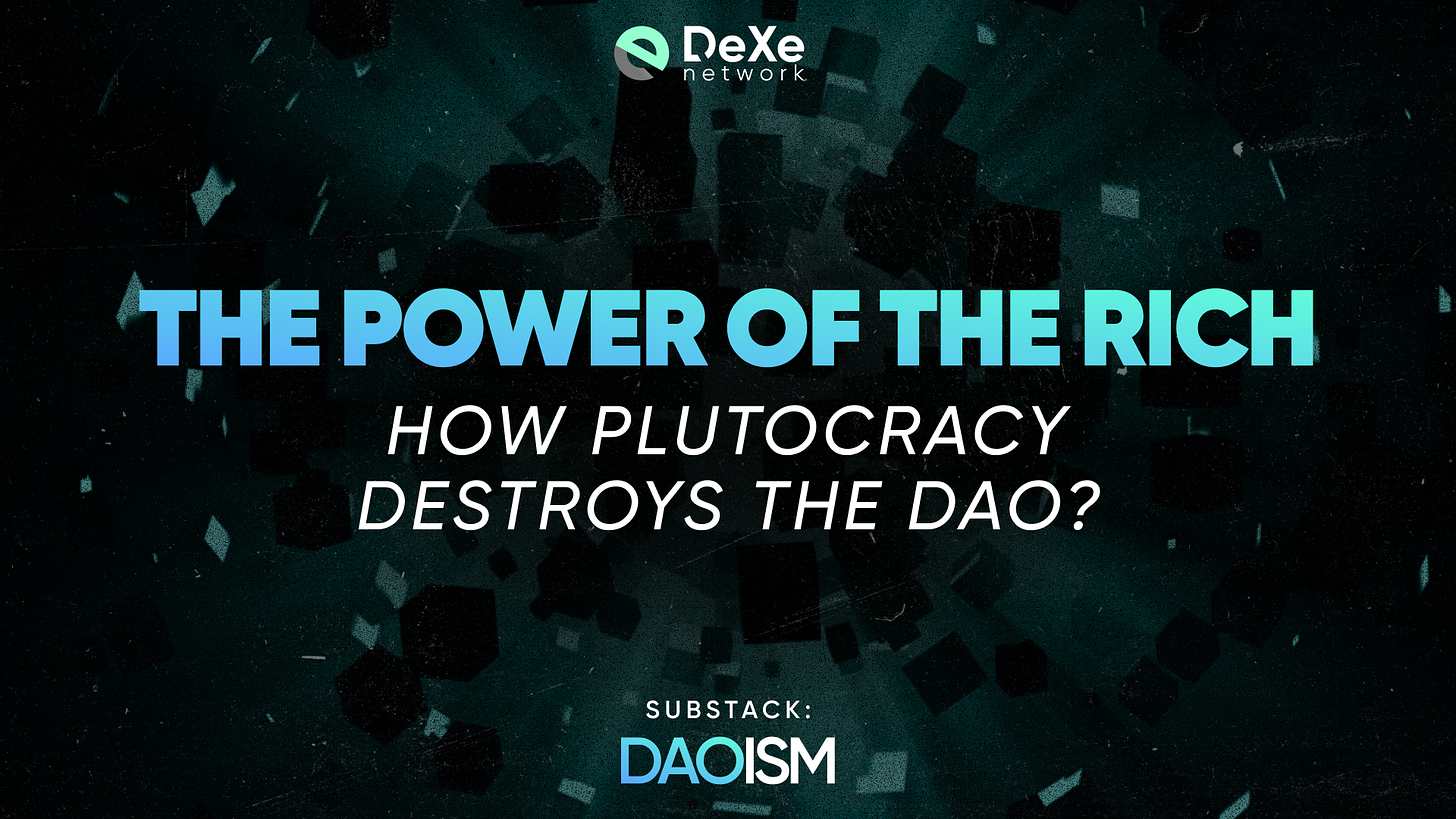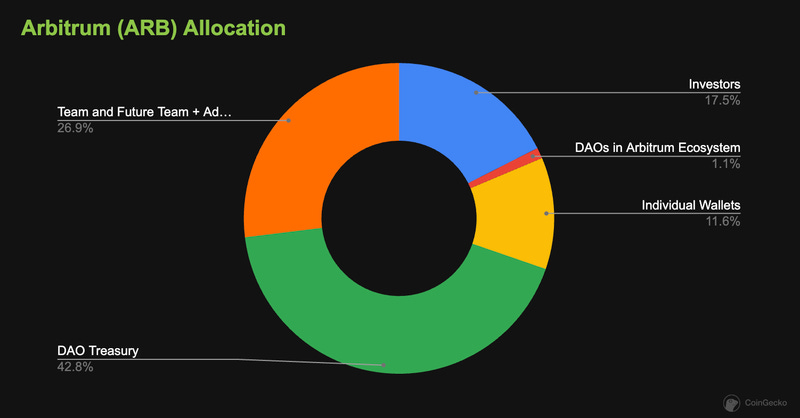The Power of the Rich, or How Plutocracy Destroys the DAO
Mankind has already invented hundreds, if not thousands, of different political structures. Some of them have been successful, some have been questionable. But if we look more narrowly, our socio-political system has not changed much since antiquity. May the philosophers of the Enlightenment forgive us.
However, technological development is still changing the rules of the game. And one of our society's major victories is decentralization on a completely different scale. However, it also suffers from "old problems”. In this article we will talk about plutocracy and how it is destroying one of the best forms of bringing people together - the DAO.
What is a plutocracy?
Let us begin with the theory. Plutocracy is a form of government in which the rich and wealthy have significant influence and control over the political and economic spheres of society. The term "plutocracy" comes from the Greek words "plutos" (wealth) and "kratos" (power).
Some famous historical examples of plutocratic rule include the Renaissance in Italy, where wealthy merchants and bankers controlled city-states (you've probably heard of the Medici family), and the Merchants' Guild in medieval Germany, which had considerable influence over economics and politics.
If we talk about modern times, nothing has changed. Many countries are considered plutocratic because of the strong influence of the wealthy classes on the political process and economic decisions. For example, the United States is often associated with plutocracy because of the significant influence of large corporations and wealthy donors on elections and political decision-making. Similar concepts work in South Korea and Japan.
All in all, without much explanation, it is clear why the power of the rich is not particularly good. Especially if you are a left-wing fanatic. However, we will give a few key examples.
Why is plutocracy bad?
Inequality and social division: Plutocracy can lead to greater inequality in society. Rich people have more opportunities and access to resources, which can create social divisions and economic inequalities.
Distortion of the democratic process: Plutocracy can undermine democratic principles and processes. Rich people can use their financial resources to manipulate elections, lobby for political decisions, and create unequal conditions for competition.
Lack of responsibility and control: In a plutocratic system, wealthy people can avoid responsibility for their actions and evade control. They may be able to use their power and wealth to protect their interests and avoid fair punishment for corruption or abuse of power.
How does plutocracy affect the DAO?
Most DAO models operate on the principle of "1 token - 1 vote. That is, the richest DAO members can control everything - without any resistance from other members.
What can this lead to?
To very different consequences. From the most minimal - when the opinion of less wealthy players is simply not taken into account. To the worst - when a group of dishonest members steal money or make decisions that are aimed at destroying the organization.
Also, there are a lot of questions when the richest (and most powerful) member is the founder. Thus, the whole concept is lost. A similar situation was with EOS founder Dan Larimer, when his DAO members began to complain en masse about the management (or rather, about the lack of efficiency).
And another, but not less unpleasant situation is the underestimation of active, but less wealthy members. Often, it is on them that many of the processes in the DAO are held.
Real problems
In order to show the problem in real time, we need to analyze the tokenomics of a fairly well-known project - Arbitrum DAO.
As we can see, the Arbitrum team and investors jointly own 44% of the project's entire fund. Which is already more than their DAO Treasury. Note that these tokens do not participate in the voting. And this we are not even considering Individual Wallets.
In the end we have a very entertaining picture: The total number of tokens that take part in the voting is 56%. Of these, more than 80% are held by the team and investors.
That is, a quorum of 51% is simply impossible to achieve without them, indicating total centralization.
What does that mean?
In the long run, especially in crisis situations, Arbitrum can dramatically cease to be a DAO and become a centralized system where all decisions are made by the team and investors.
Is that a bad thing? No, but it's just not a DAO.
With this example, we want to show that it is important not only to distribute the number of tokens fairly, but also to build competent tokenomics. The kind that will really be DAO.
How to defeat plutocracy in the DAO?
We have come to the most important question - how and what to replace the principle of "one token - one vote. In fact, there are options. And there are quite a few of them.
Quadratic Voting
Quadratic Voting — is a voting methodology used in DAOs (distributed autonomy organizations) and other systems for collective decision-making. In a quadratic voting system, each participant is assigned a certain number of votes, proportional to the square of the number of tokens he possesses.
The principle of quadratic voting is that participants are given the opportunity to "invest" their votes in certain proposals or decisions that they consider important. Each participant can distribute their votes among the various options, but the number of votes they can cast for each option decreases as the number of votes increases.
The advantages of a quadratic voting system include:
Respect for Minorities: Because quadratic voting allows participants to concentrate their votes, it respects minorities and allows them to express their views more strongly. This can help prevent majority dominance and create fairer decision-making.
Consideration of the value of the vote: A quadratic voting system takes into account not only the number of tokens, but also their value to each participant. This means that a participant with more tokens may still have more influence, but a participant who wants to strengthen their position can do so with more votes, which requires additional resources.
The quadratic system also has disadvantages. Probably the most important one is the difficulty in constructing (error-free) and training DAO members in its use.
Delegated Voting.
In this approach, participants can delegate their votes to other participants whom they trust or consider competent. Thus, participants can delegate their votes to experts or delegates to make decisions on their behalf. This allows participants who do not have sufficient expertise or time to participate effectively in the decision-making process.
But it is worth bearing in mind that the solution to the problem of plutocracy here is "partial. After all, the plutocrat can still influence decisions. On the other hand - it would be much more effective if tokens from treasury were delegated by the whole DAO, instead of lying idle.
Qualitative Tokenomics Planning
This is a problem we have already dealt with above on the Arbitrum case. But this problem exists in many projects. First of all, because many protocols were originally not DAO and switched to this structure in the process. But this kind of transition is not a snap of the fingers. We need to recycle everything, including tokenomics.
Therefore, when creating a DAO, it is crucial to think about a transparent and fair tokenomics that will not make the funders, investors, or holders of a large number of coins dominant.
Custom unique systems
Ultimately, DAO is your sandbox. And you can come up with any system that your community is comfortable with. For example, like the guys at Optimism Collective, who use an interesting bicameral voting system.
They have a "Token Chamber," which votes on project incentives, protocol upgrades, and manages the treasury fund. And also a "Citizens House" that focuses on the distribution of retroactive funding for public goods generated from revenues collected by the Optimism network. Citizenship is provided by non-transferable tokens and over time will be distributed to an increasing number of citizens.
Or maybe you'll like Element's dynamic governance council protocol. Element created a Governance Steering Council (GSC) with additional governance powers and responsibilities. It consists of members who are delegated at least 110,000 tokens, or 0.9% of the circulating supply. The membership threshold is set on a permanent, rolling basis, so the GSC is always open to anyone who has received enough authority. Board membership is dynamic on a blockchain basis, meaning delegated votes can change at any time, resulting in a change in membership.
You can read more about these and other systems at this link.
Instead of an afterword
The DAO concept is still evolving and has not yet reached its peak. In fact, we can only see the beginnings of a future that is decentralized, stable and fair.
However, there are a lot of unresolved issues on the way. And the principle of voting is one of the most important.
We understand that DAOs are individual and beautiful. But we still need to move toward some institutionalized principles that can be considered the "best." Or at least the most "right" ones.
We'll see how it turns out, and whether we can beat plutocracy.





